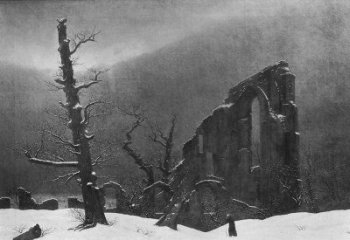Gefrorne Tränen
Heinrich Heine, definitely one of the most gifted German poets of all times, compared his poems with the ones by Müller and came to the (surprisingly) modest conclusion that Müller's poems are real folk songs whereas his own poems are only close to folk songs. And it is true: although Heine wrote most of his poems in the manner of folk songs only one (Die Lorelei) became a folk song (whatever that may be) - but a handful of Müller's poems are found in all folk song anthologies. Like Heine, Müller tried to write in a simple and clear manner, using prototypical folk song stanzas. Gefrorne Tränen (Frozen Tears) is written in a stanza which is as folksy as can be. The probably most famous of all folk songs uses it (if you read it as a song with four-line-stanzas): Am Brunnen vor dem Tore, Müller's Lindenbaum. This stanza is No. 2 in the hitparade of the stanzas most often used in German poetry and it was especially popular with folk songs and folk song parodies: Ich hört ein Sichelein rauschen, Es ist ein Schnee gefallen, Es wollt ein Jäger jagen, Mariechen sass weinend im Garten, Mein Hut, der hat drei Ecken - all these songs are known to almost every one in German-speaking countries who sings sometimes. Clemens Brentano and Achim von Arnim, two of the key Romantiker figures, made these songs popular in their folk song anthology Des Knaben Wunderhorn (The Boy's Horn of Plenty) and, well, let's say they updated the songs they had found and it is not sure that the stanza they give us is the original one. Müller, who definitely knew the anthology, used the given stanza and knew that people would think of the Wunderhorn folk songs. That's the way you made hits some 200 years ago.
The first stanza
|
Gefrorne Tropfen fallen Von meinen Wangen ab: Ob es mir denn entgangen, Dass ich geweinet hab? |
|
(Frozen drops are falling down from my cheeks: have I failed noticing that I have wept?) |
This is a very simple stanza telling a very simple thing but the image is so vivid and the whole thing so artisticly given that it belies everyone who thinks Müller a minor poet. It sounds exactly like an old folk song and justifies Heine's envy: two lines for the real thing going on, two lines for the meditation, deliberately semi-archaic words and expressions ("abfallen" sounds strange and old-fashioned but at the same time extremely realistic, the old-fashioned and poetic "geweinet" instead of "geweint" has a folk song flavour, the conjunction "ob" is odd and rare at this place). We get a lot of emotion without unnecessary waste of words: a man weeping in wintertime who failed to notice his weeping and now hears and feels the falling-off of the frozen tears. Frozen tears - that alone is a marvellous idea (is it Müller's?).
When we look at the words in the course of the cycle the rage of Die Wetterfahne has gone. There are tears, there is mourning, depression, pain, there may be numbness, too, since the wanderer doesn't notice his tears at first. (How long does it take for tears to freeze? And can they freeze on a face? Aren't they supposed to fall off because of gravity? Questions beyond poetic license.)
The second stanza
|
Ei Tränen, meine Tränen, Und seid ihr gar so lau, Dass ihr erstarrt zu Eise Wie kühler Morgentau? |
|
(Well tears, my tears, are you really so very lukewarm that you freeze and become ice like cool morning dew?) |
Müller again uses folk song words: "Ei" doesn't mean "O" like some translators have it, it is a word used in addressing people in harmless mockery. Here the word is used to show the wanderer's surprise at the temperature of his tears. He obviously expects tears to be hot (are they? I have never measured my tears' temperature), especially his tears should be hot (since he has suffered such pain) and now he finds them "lau" (and Müller says "gar so lau" which expresses reproach and even contempt). How can his tears so willingly freeze like the cool morning dew, like cold nature around him? Isn't he human, hasn't he got a hot heart?
Stanza three
|
Und dringt doch aus der Quelle Der Brust so glühend heiss, Als wolltet ihr zerschmelzen Des ganzen Winters Eis! |
|
(And yet you come out of the spring of the breast so blazingly hot as if you wanted to melt away the entire winter's ice!) |
After two rhetorical questions a tremendous exclamation, an outburst of emotion. In four short lines an avalanche of words depicting heat and energy: "glühend heiss", "zerschmelzen" (the prefix "zer-" means "tear into two or more pieces", it is used in zerstören (destroy), zerfetzen (to tear apart), zergehen (to dissolve)), "dringen" (which means "to come with a lot of energy"). The tears may be lukewarm and given over to the power of the cold winter but they press out of the wanderer's wounded heart, they come out so blazingly hot (the very words hurt) that it does not seem impossible that their aim is to violently melt away all the ice of the winter. Well, this is a magnificently given powerful exaggeration showing again simultaneously the pain the poetic I suffers, the pride he takes in it - and his actual helplessness: his pain has no real effect, it wounds only himself. The winter journey's fruitless turning-round goes on.
